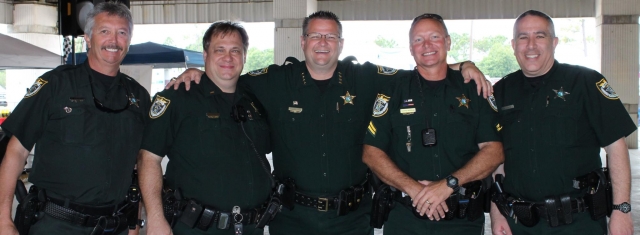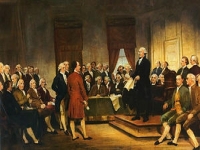Politics
Rock Out The Violence Event At Wickham Park
Domestic Violence Fundraiser

Brevard County Sheriffs (Source: www.facebook.com/BrevardCountySheriff)
USPA NEWS -
"Domestic Violence comes in many forms with an everyday changing world it is important that law enforcement continue in their education and be informed. Will some of those funds be used to seek better training and response time to protect those victims?" ~Journalist Joseph Kirk The Objective Review
"I would like to personally thank the members of our Reserve Unit, Bomb Unit, and K-9 Team who worked today's "Rock Out The Violence" event at Wickham Park. The annual event raises money to help support victims of Domestic Violence in Brevard County. Our team members were instrumental in the success of the event and I greatly appreciate their participation for such a great cause." ~Sheriff Wayne Ivey
"Domestic victimization is often under reported for reasons such as intimidation, embarrassment, lack of resources and isolation to the world, making victims feel almost incapable of leaving." ~University of Illinois Springfield Journal Journalist Cameryn Barbeau
Juanita Ortiz, UIS criminal justice professor, said, “Oftentimes, the victim feels scared to leave a relationship because they know what the abuser is capable of, and they fear even further harm based on threats about what would happen if they attempt to leave. Such threats can involve harm against the victims, their children, family members, friends or even pets. Abusers can even threaten to kill or hurt themselves and blame it on the victim´s attempts to leave.“
Juanita Ortiz, UIS criminal justice professor, said, “Oftentimes, the victim feels scared to leave a relationship because they know what the abuser is capable of, and they fear even further harm based on threats about what would happen if they attempt to leave. Such threats can involve harm against the victims, their children, family members, friends or even pets. Abusers can even threaten to kill or hurt themselves and blame it on the victim´s attempts to leave.“
However, there are obvious and painful problems with some domestic violence policies and practices. Too often public policy makers ignore the empirically based policy relevant findings of National Institute of Justice (NIJ) sponsored studies. Too often domestic violence advocates and public policy makers do not even know these studies exist.
Many NIJ studies document mandatory policies, practices and "one-solution-fits-all" criminal justice intervention processes have produced some unintended negative consequences. These mandatory polices and practices can save some lives and can make some families safer. However, at the same time NIJ studies documents they can have some negative effects and endanger victims they are intended to protect.
Many NIJ studies document mandatory policies, practices and "one-solution-fits-all" criminal justice intervention processes have produced some unintended negative consequences. These mandatory polices and practices can save some lives and can make some families safer. However, at the same time NIJ studies documents they can have some negative effects and endanger victims they are intended to protect.
All to often children are left without a voice or placed in harms way by the failure or abuse of the systems designed to protect them. All to often policy makers and the officers charged to enforce them forget their common purpose and sense of duty. That common purpose is to serve and protect. These policies are often referred to as law.
However the law in the united states is defined under article VI of the United States Constitution. That law is the supreme law of the land and is designed to ensure life, liberty and the pursuit of happiness for peace and prosperity. The protection of our youth ensures our legacy of life to continue on for generations to come.
What is a law enforcement officer? Its meaning and definition are as plainly understood as the words are written. A citizen that enforces the law as defined in the United States Constitution under Article VI. This is the very reason to be a law enforcement officer those officers are required take the oath to uphold and defend the Constitutions which vest them with lawful authority.
What is LAW? What are Statutes or in some states code? What are rights? What are public policies? What is the common defense? At first it sounds confusing but when examined it is all too simple.
Conflicting statutes, policies without awareness can effect our youth and our nation this is why the nation as a whole "we the people" guaranteed a republic form of government.
I pledge allegiance to the flag of the United States of America,
and to the Republic for which it stands,
one Nation under God, indivisible, with liberty and justice for all."
Conflicting statutes, policies without awareness can effect our youth and our nation this is why the nation as a whole "we the people" guaranteed a republic form of government.
I pledge allegiance to the flag of the United States of America,
and to the Republic for which it stands,
one Nation under God, indivisible, with liberty and justice for all."
In the Pledge of Allegiance we all pledge allegiance to our Republic, not to a democracy. "Republic" is the proper description of our government, not "democracy." I invite you to join me in raising public awareness regarding that distinction.
A republican form of government is a type of government in which the citizens of a country have an active role in the affairs of the government, and the government is not headed by a hereditary ruler such as a king. A republic and a democracy are identical in every aspect except one. In a republic the sovereignty is in each individual person. In a democracy the sovereignty is in the group.
In the constitutional republic of the United States of America the government is headed by a President, and includes branches of government which oversee legislation and judiciary matters. There are lots of ways to set up and administer a republican form of government. The important thing to remember is that such a government is not a democracy. Democracy as a concept is integrated into America's republican form of government to be fair to the citizens giving it authority to govern, but it is also possible to see abuses of power and a ruling class in a republican form of government.
A statute is a written law passed by a legislature on the state or federal level. Statutes set forth general propositions of law that courts apply to specific situations. A statute may forbid a certain act, direct a certain act, make a declaration, or set forth governmental mechanisms to aid society.
The power of statutes over other forms of laws is not complete, however. Under the U.S. Constitution and state constitutions, federal and state governments are comprised of a system of checks and balances among the legislative, executive, and judicial branches. As the system of checks and balances plays out, the executive and judicial branches have the opportunity to fashion laws within certain limits.
The power of statutes over other forms of laws is not complete, however. Under the U.S. Constitution and state constitutions, federal and state governments are comprised of a system of checks and balances among the legislative, executive, and judicial branches. As the system of checks and balances plays out, the executive and judicial branches have the opportunity to fashion laws within certain limits.
The Executive Branch may possess certain lawmaking powers under the federal or state constitutions, and the judiciary has the power to review statutes to determine whether they are valid under those constitutions. When a court strikes down a statute, it in effect creates a law of its own that applies to the general public.
Laws created through judicial opinion stand in contradistinction to laws created in statutes. Case law has the same legally binding effect as statutory law, but there are important distinctions between statutes and case law. Case law is written by judges, not by elected lawmakers, and it is written in response to a specific case before the court.
Laws created through judicial opinion stand in contradistinction to laws created in statutes. Case law has the same legally binding effect as statutory law, but there are important distinctions between statutes and case law. Case law is written by judges, not by elected lawmakers, and it is written in response to a specific case before the court.
A judicial opinion may be used as precedent for similar cases, however. This means that the judicial opinion in the case will guide the result in similar cases. In this sense a judicial opinion can constitute the law on certain issues within a particular jurisdiction. Courts can establish law in this way when no statute exists to govern a case, or when the court interprets a statute.
Judicial opinions also provide legal authority in cases that are not covered by statute. Legislatures have not passed statutes that govern every conceivable dispute. Furthermore, the language contained in statutes does not cover every possible situation.
Judicial opinions also provide legal authority in cases that are not covered by statute. Legislatures have not passed statutes that govern every conceivable dispute. Furthermore, the language contained in statutes does not cover every possible situation.
Courts tend to follow a few general rules in determining the meaning or scope of a statute. If a statute does not provide satisfactory definitions of ambiguous terms, courts must interpret the words or phrases according to ordinary rules of grammar and dictionary definitions. If a word or phrase is technical or legal, it is interpreted within the context of the statute. For example, the term interest can refer to a monetary charge or ownership of property. If the term interest appears in the context of a statute on real estate ownership, a court will construe the word to mean property ownership. Previous interpretations of similar statutes are also helpful in determining a statute's meaning.
"Police work is often lionized by jurists and scholars who claim to employ "textualist" and "originalist" methods of constitutional interpretation. Yet professional police were unknown to the United States in 1789, and first appeared in America almost a half-century after the Constitution's ratification. The Framers contemplated law enforcement as the duty of mostly private citizens, along with a few constables and sheriffs who could be called upon when necessary. This article marshals extensive historical and legal evidence to show that modern policing is in many ways inconsistent with the original intent of America's founding documents. The author argues that the growth of modern policing has substantially empowered the state in a way the Framers would regard as abhorrent to their foremost principles." ~Seton Hall Constitutional L.J. 2001, 685
So what about those children being exploited and abused while officers sit quietly by and are intimidated by attorneys?
What can Law enforcement do?
Thomas Paine said it best... "use common sense".
Any issue before a review no matter how complex always started by a simple act. The complexities are often a distraction and amid those distractions one important fact is often forgotten.
....... The Victim.
What can Law enforcement do?
Thomas Paine said it best... "use common sense".
Any issue before a review no matter how complex always started by a simple act. The complexities are often a distraction and amid those distractions one important fact is often forgotten.
....... The Victim.
Brevard County Sheriff Wayne Ivey Wickham Park Florida Domestic Violence Protect Serve Defend Victims Law Enforcement Training Education
Liability for this article lies with the author, who also holds the copyright. Editorial content from USPA may be quoted on other websites as long as the quote comprises no more than 5% of the entire text, is marked as such and the source is named (via hyperlink).









